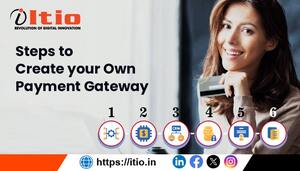Steps To Create Your Own Payment Gateway
Corps
In the dynamic world of eCommerce and online transactions, having a reliable and efficient payment gateway is crucial for businesses. For entrepreneurs looking to venture into the fintech industry, starting your own payment gateway business can be a lucrative endeavor. This comprehensive guide will walk you through the essential steps to start your own payment gateway business, from inception to implementation.
Step 1: Market Research and Planning
Before getting deep into the technical aspects of how to start your own payment gateway business, you need to conduct thorough market research to understand the demand, competition, and potential challenges in the payment gateway industry. Identify your target market, analyze the needs of businesses, and outline a comprehensive business plan that includes financial projections, marketing strategies, and a roadmap for growth.
Step 2: Legal and Regulatory Compliance
Navigate the legal landscape by ensuring compliance with local and international regulations governing payment processing. This may include obtaining necessary licenses, adhering to data protection laws, and implementing robust security measures to protect sensitive financial information.
Step 3: Choose a Business Model
Decide on the type of payment gateway business model that aligns with your goals before you start your own payment gateway business.
Common models include:
- Aggregator Model: Combine multiple merchants into a single account, simplifying the onboarding process for small businesses.
- Dedicated Merchant Account Model: Provide individual merchant accounts for businesses, offering more customization but requiring a more complex setup.
Step 4: Build a Team
Assemble a skilled team with expertise in areas such as software development, cybersecurity, marketing, and customer support. A dedicated and knowledgeable team is crucial for the success of your payment gateway business once you’ve decided to start your own payment gateway business.
Step 5: Technology Stack and Infrastructure
Invest in a robust technology stack to support your payment gateway.
This includes:
- Payment Gateway Software: Develop or acquire a secure and scalable payment gateway software that facilitates seamless transactions.
- Payment Processing APIs: Integrate with reliable payment processing APIs to connect with banks and financial institutions.
- Secure Server and Hosting: Ensure a secure server environment with SSL certification to protect data during transactions.
Step 6: Security Measures
Implement stringent security measures to protect against fraud and ensure the confidentiality of user data.
Key security features include:
- Tokenization: Replace sensitive information with unique tokens to prevent data exposure.
- SSL Encryption: Use Secure Socket Layer (SSL) encryption to secure data transmitted between users and your payment gateway.
- Two-Factor Authentication: Enhance user authentication with additional security layers.
Step 7: Payment Card Industry Data Security Standard (PCI DSS) Compliance
Adhere to PCI DSS standards, a set of security protocols designed to protect cardholder data. Compliance is essential for gaining trust from merchants and customers alike and avoiding penalties for non-compliance.
Step 8: Integration with eCommerce Platforms
To broaden your reach and attract more merchants, ensure seamless integration with popular e-commerce platforms. This facilitates easy adoption for businesses and expands your potential customer base.
Step 9: User-Friendly Dashboard and Analytics
Develop an intuitive dashboard that allows merchants to manage transactions, view analytics, and access essential reports. Providing insightful analytics helps merchants track their business performance and make informed decisions.
Step 10: Obtain Partnerships and Agreements
Establish partnerships with banks, financial institutions, and other key players in the payment ecosystem. Negotiate favorable agreements to access necessary resources, including merchant accounts, transaction processing, and financial infrastructure.
Step 11: Testing and Quality Assurance
Before launching your payment gateway, conduct thorough testing to identify and rectify any bugs or vulnerabilities. Rigorous quality assurance ensures a smooth and reliable user experience for both merchants and customers.
Step 12: Marketing and Launch
Craft a comprehensive marketing strategy to start your own payment gateway business and promote your payment gateway. Utilize digital marketing channels, social media, and partnerships with e-commerce platforms to create awareness and attract merchants to your platform. A well-executed launch plan is essential for gaining momentum in the market.
Step 13: Provide Excellent Customer Support
Offer exceptional customer support to address queries, resolve issues, and build trust with your merchant clients. A responsive and reliable support team contributes significantly to customer satisfaction and retention.
Step 14: Continuous Improvement and Innovation
Stay ahead of the competition by continuously innovating your payment gateway. Monitor industry trends, gather feedback from users, and implement updates to enhance security, features, and overall performance.
Conclusion
Your decision to start your own payment gateway business requires a strategic approach, technological expertise, and a commitment to security and compliance. By following these steps, you can establish a robust and competitive payment gateway that meets the needs of businesses and consumers alike. As the fintech industry continues to evolve, your dedication to innovation and customer satisfaction will position your payment gateway business for long-term success in the dynamic world of online transactions.
Need more help on how to start your own payment gateway business? Get connected with us at ITIO Innovex now.











commentaires